#legend of zelda - the franchise where everything's made up and the points don't matter
Text
Sir Nobody
(Notes before beginning: *Spoilers for A Link to the Past and related manga, and Oracle of Seasons and Ages manga. *Reminder that manga reads right to left.)
I've said before that I don't subscribe to the fancanon that Legend is Zelda's brother, because the point of Legend - or, indeed, any Link - is that they come from humble origins.
But that's not entirely true.
In A Link to the Past, Link is the last in a bloodline of knights that Agahnim seeks to destroy.
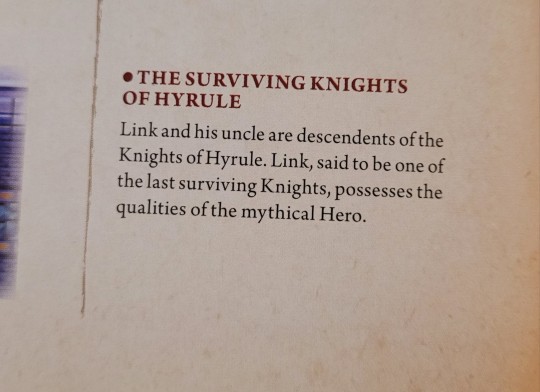
But he didnt know that.
In Shotaro Ishinomori's A Link to the Past comic, after Link's parents (both knights) disappeared into the Dark World, his uncle deliberately kept him from royal politics, and Link believed his parents to have simply died. He gets called into the role of the Legendary Hero, completely baffled, wondering why the hell some ordinary kid can suddenly telepathically communicate with the princess.
It's much the same in the Akira Himekawa manga. Link has lived a docile life being an apple farmer, raised by his uncle, believing his parents died when he was a baby. His uncle suggests that when Link was younger he had dreams of being a swordsmith, and Link fobs him off thusly -
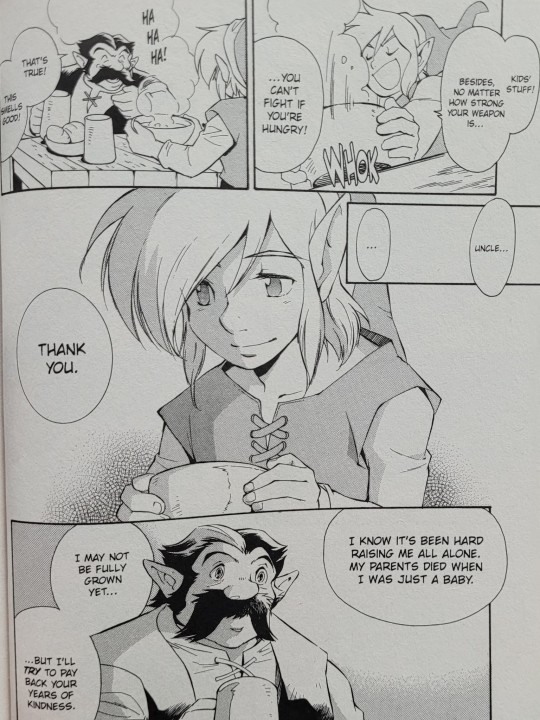
(Also, he cooks!)
Later, when shit starts to hit the fan, it's evident that Link was totally invested in his orchard, and the future he'd seen for himself was that of a provider.

He was thrust on his journey with just as much bewilderment as most of the other Links.

Here is also a good place to compare the wording of his uncle's final dialogue in the Japanese vs English releases of the game. English gives us, "Save the princess. Zelda is your...", which of course gave rise to the theory that Zelda "is your... sister." The original, though, is "Protect Princess Zelda. You are, the princess's..." which leads more naturally into something like, "... final/only hope", or even more bluntly, "knight". And, the use of save is quite vague, whereas protect has stronger connotations with the specific duty of a knight.
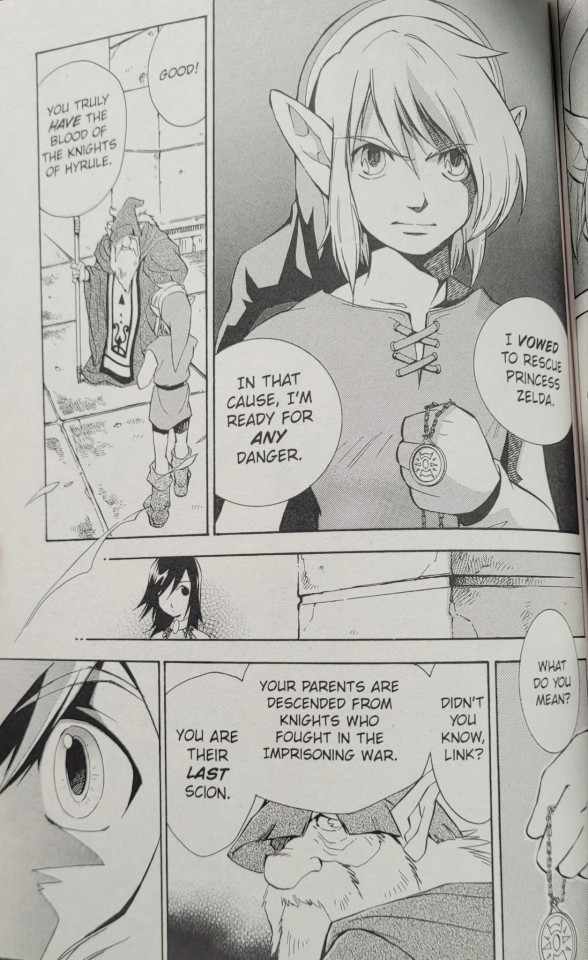
Ultimately, he decides it doesn't matter where or who he came from, the only self that matters is the one right now.

In the Oracle of Seasons manga, Link is born with the triforce on his hand; his family knows he's destined for great things.
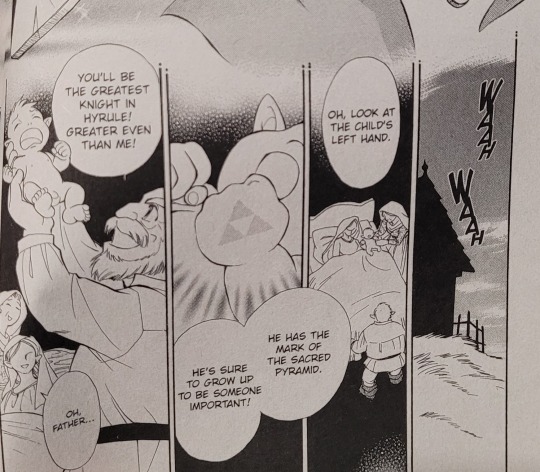
And he does know, in this case, that he comes from a long line of knights. But he doesn't want to be one. He wants adventure, not glory. (Also fits the characterisation of Legend not wanting a leadership role.)
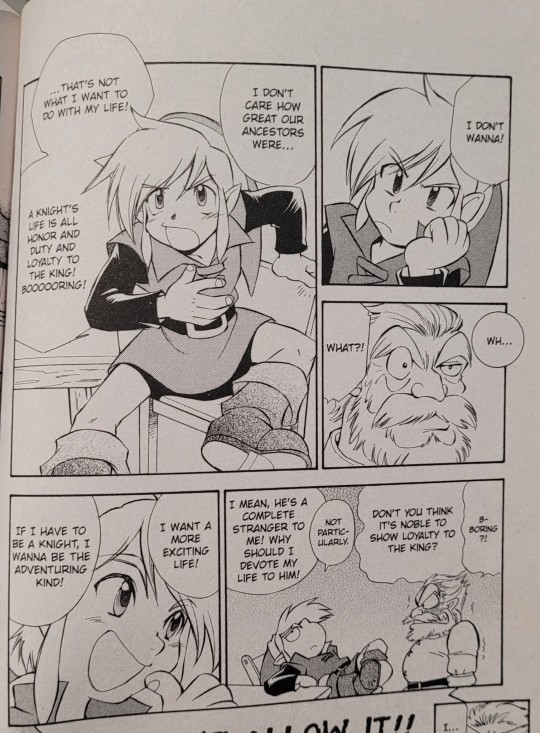
Like, when Impa notices his hand -
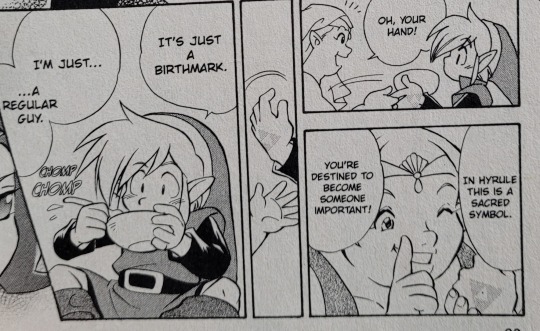
And actually, the only reason he ended up on an adventure is because his grandma convinced him to take the knights' trial in Castletown, where he was then transported to Holodrum.

Maybe this advice stuck with him.
So we all know Zelda lore is a cobbled together mess, right. Link's Awakening came after A Link to the Past, so it was said that Link was on the boat in the first place travelling away from Hyrule to "continue his training" after defeating Agahnim in ALttP.
Then the Oracle games came out, and they (according to Hyrule Historia, at least) are set between the previous Hero of Legend games. By all accounts, it seems his Seasons and Ages journeys weren't all that voluntary; he didn't travel to Holodrum and Labrynna so much as he was magically sent there. And he was on his boat trying to sail back to Hyrule from those places when the events of Link's Awakening happened. Or... sailing to yet another new land to continue his training, if you read the Zelda Encyclopedia.
Everything, all over the place.
(This is to say nothing of Sir Raven's influence on Link actually wanting to become a knight in the Oracle of Ages manga.)
My point is, no matter how you want to interpret the Hero of Legend, I still think he meant it when he described himself as a "nobody". At the very least, he wants everyone (and himself) to believe he is. I also think there's interesting potential in the fact that he's mistrustful, disdainful of knights after having them turned against him, and maybe because of this he doesn't want to telegraph that he comes from a long line of them.
#hero of legend#linked universe#lu legend#lu? analysis#theorising and shit#idk how to tag man#legend of zelda - the franchise where everything's made up and the points don't matter#ramble on
94 notes
·
View notes
Text
Sudden Vulnerability
Today I want to talk about one of my favorite features in stories: surprise vulnerability.
Vulnerability, in this case, means a character revealing a weakness or insecurity in themselves that another character can, if they so choose, use to utterly destroy the first one.
For example, person A ("Alice") and person B ("Bob") are talking, and suddenly, out of nowhere, Alice reveals that she's long had deep romantic feelings for Bob. It's weird, right? Maybe it's something that we, as bystanders, already knew. Maybe Alice was the main character of this story the whole time.
But the point is, Bob now has a choice: he can hurt Alice or not. And we don't want him to hurt her, so we cheer for the idea of him not hurting her.
I'm going to give two examples. Neither is long, or complex, and both are from fairly popular franchises that had installments in 2017 and got sequels this year.
Example 1.
In Guardians of the Galaxy Vol. 2, there's a famous line where Yondu shouts "I'm Mary Poppins, y'all!" It's been memed to death. It's very funny. It's a great line.
What led up to that line? And no, I don't mean the story about how it wasn't originally in the script (https://screenrant.com/guardians-galaxy-2-yondu-mary-poppins-line-origin/). I mean the actual dialogue from the movie:
"You look like Mary Poppins."
"Is he cool?"
"Hell yeah, he's cool."
When Yondu asks, "Is he cool?" What he's asking isn't "Is Mary Poppins a cool person?" What he's asking is, "Am I a cool person?"
What he's saying is, "Son, I want you to think I'm cool. I want you to tell me that I'm cool."
What Peter realizes in that moment is "My dad cares what I think about him. I have an opportunity here to hurt his feelings. To absolutely devastate him. Or I can make him happy. I can make him feel cool."
What's happened here is that Yondu has suddenly shown vulnerability. He's made it clear to Peter that he has an ego, and it's fragile, and he worries about what his son thinks of him. He wants to be cool in the eyes of the man he raised. That matters to him.
So when he says "I'm Mary Poppins, y'all!" What he's saying is "My son thinks I'm cool!"
It's a great moment, and it works because it's a funny joke, and because everyone was on board with Yondu being vulnerable in that moment.
It's easy, when you're a kid, to view your parents as "adults," which are totally separate from you and your kid peers. But they aren't. They're just kids who grew up. Adults care about how they're seen. Not in the same ways, that's for sure. But they care. Yondu cares. He loves his son, even if he was never great at showing it. And, as he floats down with his Mary-Poppins-like wand in hand, he wants to know that his son loves him, too. He gets that confirmation, and it makes him so proud that he shouts it to everyone. "My son loves me, y'all."
Example 2.
In The Legend of Zelda: Breath of the Wild, when you defeat the final story boss, the giant monster made out of pure dark energy using a magical Deus Ex Machina Bow that Zelda herself beams down into your hands (it's bad; it's a bad boss fight, and I hate it), she appears before you for the first time in the game.
If you've been a good player, you've seen her in flashbacks. You've heard her speak to you telepathically. You've slowly regained your memories of how you met her. How you saved her life, back before you were the you are now. How you kept her safe while everyone around her died due to her weakness, and how that devastated her. How you, before you were the you controlled by you, and her, a hundred years before she was the her she is now, became close.
You've remembered who you were, and who she was, and now, a century later, which passed by for you like it was nothing and for her like it was a hundred years, she stands before you. She's everything you hoped she would be. She's a hundred and seventeen years old. The Seventh Sage, the leader of them all, with the Triforce of Wisdom. She held back the Calamity Ganon for 85% of her life, and now she can walk around again.
And she congratulates you on what you've done. She tells you what you, the player, want to hear, as her theme, Zelda's Lullaby, plays in the background. It's boilerplate. It's standard. It's powerful and official and regal.
"I've been keeping watch over you all this time. I've witnessed your struggles to return to us, as well as your trials in battle. I always thought, no, I always believed, that you would find a way to defeat Ganon. I never lost faith in you over these many years. Thank you, Link, the Hero of Hyrule."
Then the music cuts out. It's done. She's done. She's been the Sage who held back the Calamity for so long, but all of a sudden she's just a seventeen-year-old girl again, looking at a boy she likes, and she's afraid, and hopeful, and she needs to know something.
"May I ask… Do you really remember me?"
She's the strongest woman in the world, and she's vulnerable, right then. All of a sudden, none of what happened in the last hundred years matters except that Link lost his memory, and Zelda didn't, and she wants to know that he's regained it and that he knows who she is and who he was and who they were together, back before Link was you. She wants to know that, now that she can walk around and be a girl again, a literal child, that there's someone left in the world who cares about her as much as she cares about them.
Because, if not, what was it all for?
Saving the kingdom? Of course. That's her duty as the Sage. That's what she needed to do. But what she wanted to do, what kept her going, was thinking about seeing her sworn knight and protector once more. Now, here he is, and she isn't sure if he's the same guy or not.
I've written about moments like these before. I wrote about a couple in my Death Stranding essay from a few years back. I won't repeat it here, but I didn't emphasize it in the same way. Maybe it hadn't really clicked for me yet.
Characters need to be vulnerable for me to care about them. I don't want to give examples of characters who are never vulnerable, though I can think of a few.
A lot of movies try to make characters who are vulnerable for a few seconds at a time so we'll care about them. I don't care about that kind of thing, at least, not for the purposes of what I'm writing here.
I wanted to come up with two examples of a character very suddenly revealing vulnerability in a way that is deliberately shocking.
You don't have to share more with me. I think I've made the point I wanted to make, which is that it's pretty goddamn cool when stories do this kind of thing. It's a good thing to do in a story.
3 notes
·
View notes